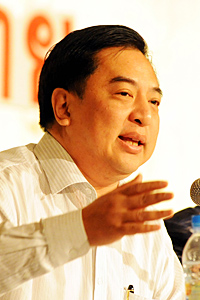
As the new constitution has become law, two seemingly unrelated incidents could mar the path towards national reconciliation and a return to democracy.
The first is the Ministry of Digital Economy and Society's issuance of a statement warning people not to "follow" or interact with three prominent critics of the regime -- Somsak Jeamteerasakul, Pavin Chachavalpongpun and Scotland's Andrew MacGregor Marshall -- who are wanted on lese majeste charges.
Then there is the "disappearance" of the memorial plaque commemorating the 1932 Siamese Revolution, a revolt that changed the political course of Thailand from being an absolute monarchy to a parliamentary democracy with a constitutional monarchy.
Both sensitive incidents have evoked conflicting emotions and are worth noting as they imply how certain freedoms will be defined under the new constitution.

Suranand Vejjajiva was secretary-general to the prime minister during the Yingluck Shinawatra government and is now a political analyst.
It is true that freedom of speech, as the basis of a creative and free society, always has its limitations. One is entitled to exercise his or her rights and liberties as long as they do not infringe on those of other people.
On top of that, Thailand has a strict lese majeste law designed to protect its revered monarchy. This law imposes a much higher degree of punishment than normal defamation laws. And as long as it exists, Thai citizens are obligated to abide by it.
If the three aforementioned critics of the regime have broken the lese majeste law, then it is up to the authorities to prosecute them through a fair and transparent judicial process. The public knows full well the consequences of disseminating and repeating any message deemed offensive to the monarchy, and most people will refrain from doing so.
The ministry's warning, however, takes us all down a murkier and uncharted course. Netizens are told not to "follow, contact, share or engage in any activity that would result in information being shared with the three [critics]". This is a reference to a Criminal Court order that prohibits the public from disseminating "inappropriate" information online.
Academics have questioned the legitimacy of such an order and whether it can be enforced legally or in practice.
The three men's privacy settings on their respective Facebook pages and other social media platforms are all set to "public", meaning everyone can read their messages without having to "like", share or retweet them. They also have blogs or printed articles that can be easily accessed without anyone knowing.
My point is this: Isn't society better off if its citizens can read, think and learn by themselves? An educated and knowledgeable public will be able to determine right from wrong and act in their best interests.
The ministry should facilitate this kind of learning process by providing a deeper understanding of cultural elements, history, social media etiquette, and the distinction between the facts and fake news. It could even run publicity campaigns. But it has no right to impose its own form of "thought control" on the masses.
Speaking of history, the missing memorial plaque is a puzzle in its own right. The original plaque reads: "Here at dawn on June 24, 1932, Khana Ratsadon brings into being the constitution for the sake of the country's prosperity."
The plaque was placed at the Royal Plaza, where the Siamese Revolution was announced. Over the decades, it has always been there (it was only removed once in the early 1960s during Field Marshal Sarit Thanarat's era) although it has been gradually worn down by passing cars, trucks and tanks.
Regardless of whether you agree or disagree with the changes brought about by the Khana Ratsadon political party since 1932, the plaque is a historical artefact that should be protected. It has always been a wonder why no fence was ever built around it.
The plaque itself has been a thorn in the heart of ultra-right-wing royalists, many of whom were happy to see it getting worn down by the constant flow of traffic. Threats of removing it surfaced from time to time. But now it is gone. Once the public learned of this, the authorities denied responsibility and merely acknowledged that it had disappeared with no attempt made to find the culprits.

A journalist photographs a new plaque fitted into the road near the Royal Plaza in Bangkok. It replaces the Khana Ratsadon memorial plaque commemorating the 1932 Siamese Revolution that went missing recently. (Photo by Apichit Jinakul)
More intriguingly, the original plaque has now been replaced by a new one reading: "May Siam be blessed with prosperity forever. May the people be happy and cheerful and become the strength of the country. The respect for Phra Ratanattaya (The Three Jewels -- Buddha, dhamma, Sangha), the state, one's family, and the faithfulness towards one's King will all contribute to the prosperity of one's state."
Both are political statements. The original one declared the existence of a new governing mechanism -- the constitution -- by the people. The replacement reads more like propaganda, with an emphasis on the three pillars of the "nation, religion and [the] King".
This difference of opinion has led to political conflicts since the Siamese Revolution. Power plays have crippled the development of democracy in Thailand since its early days and much animosity remains.
The latest round of conflicts over the last decade, in the wake of the 1997 constitution and following the rise of a populist and progressive agenda under the leadership of ousted premier Thaksin Shinawatra, resulted in two coups d'etat and prolonged street protests.
The current military regime of Gen Prayut Chan-o-cha has been increasingly authoritative, serving the agenda of elite groups and big business. The ultra right-wing royalists have asserted more influence on the current administration than they did on elected governments. There have been attempts to rewrite or omit political history in school textbooks. The list goes on.
The motive for the missing plaque may be a case of "political vandalism", or it may be another example of trying to rewrite history.
The ministry's order, and the belief that one can alter history through such acts, merely work to suppress freedom of thought and speech.
Denying events that are known to have taken place will only damage society's interests in the long run. Whatever happened, happened. Democracy may have its flaws, but the 1932 Revolution did bring about the recognition of citizens' rights and liberties. Nobody is perfect, and as events occurred and unfolded, we have learned important lessons from them.
A common good can emerge when people learn to think on their own. After that, we can improve upon all of the pitfalls and successes that ensue.
Suppression does not equal peace. Submission does not mean all is well. And a barely visible undercurrent can one day become a political tsunami.
